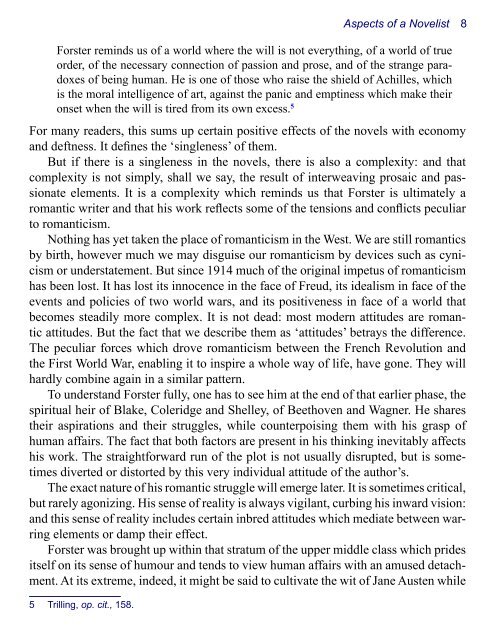The Achievement of E. M. Forster - Humanities-Ebooks
The Achievement of E. M. Forster - Humanities-Ebooks
The Achievement of E. M. Forster - Humanities-Ebooks
You also want an ePaper? Increase the reach of your titles
YUMPU automatically turns print PDFs into web optimized ePapers that Google loves.
Aspects <strong>of</strong> a Novelist <br />
<strong>Forster</strong> reminds us <strong>of</strong> a world where the will is not everything, <strong>of</strong> a world <strong>of</strong> true<br />
order, <strong>of</strong> the necessary connection <strong>of</strong> passion and prose, and <strong>of</strong> the strange paradoxes<br />
<strong>of</strong> being human. He is one <strong>of</strong> those who raise the shield <strong>of</strong> Achilles, which<br />
is the moral intelligence <strong>of</strong> art, against the panic and emptiness which make their<br />
onset when the will is tired from its own excess. <br />
For many readers, this sums up certain positive effects <strong>of</strong> the novels with economy<br />
and deftness. It defines the ‘singleness’ <strong>of</strong> them.<br />
But if there is a singleness in the novels, there is also a complexity: and that<br />
complexity is not simply, shall we say, the result <strong>of</strong> interweaving prosaic and passionate<br />
elements. It is a complexity which reminds us that <strong>Forster</strong> is ultimately a<br />
romantic writer and that his work reflects some <strong>of</strong> the tensions and conflicts peculiar<br />
to romanticism.<br />
Nothing has yet taken the place <strong>of</strong> romanticism in the West. We are still romantics<br />
by birth, however much we may disguise our romanticism by devices such as cynicism<br />
or understatement. But since 1914 much <strong>of</strong> the original impetus <strong>of</strong> romanticism<br />
has been lost. It has lost its innocence in the face <strong>of</strong> Freud, its idealism in face <strong>of</strong> the<br />
events and policies <strong>of</strong> two world wars, and its positiveness in face <strong>of</strong> a world that<br />
becomes steadily more complex. It is not dead: most modern attitudes are romantic<br />
attitudes. But the fact that we describe them as ‘attitudes’ betrays the difference.<br />
<strong>The</strong> peculiar forces which drove romanticism between the French Revolution and<br />
the First World War, enabling it to inspire a whole way <strong>of</strong> life, have gone. <strong>The</strong>y will<br />
hardly combine again in a similar pattern.<br />
To understand <strong>Forster</strong> fully, one has to see him at the end <strong>of</strong> that earlier phase, the<br />
spiritual heir <strong>of</strong> Blake, Coleridge and Shelley, <strong>of</strong> Beethoven and Wagner. He shares<br />
their aspirations and their struggles, while counterpoising them with his grasp <strong>of</strong><br />
human affairs. <strong>The</strong> fact that both factors are present in his thinking inevitably affects<br />
his work. <strong>The</strong> straightforward run <strong>of</strong> the plot is not usually disrupted, but is sometimes<br />
diverted or distorted by this very individual attitude <strong>of</strong> the author’s.<br />
<strong>The</strong> exact nature <strong>of</strong> his romantic struggle will emerge later. It is sometimes critical,<br />
but rarely agonizing. His sense <strong>of</strong> reality is always vigilant, curbing his inward vision:<br />
and this sense <strong>of</strong> reality includes certain inbred attitudes which mediate between warring<br />
elements or damp their effect.<br />
<strong>Forster</strong> was brought up within that stratum <strong>of</strong> the upper middle class which prides<br />
itself on its sense <strong>of</strong> humour and tends to view human affairs with an amused detachment.<br />
At its extreme, indeed, it might be said to cultivate the wit <strong>of</strong> Jane Austen while<br />
Trilling, op. cit., 158.

















